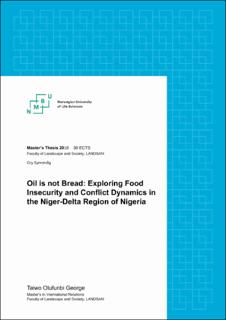| dc.contributor.advisor | Synnevåg, Gry | |
| dc.contributor.author | George, Taiwo Olufunbi | |
| dc.coverage.spatial | Nigeria, Niger-Delta | en_US |
| dc.date.accessioned | 2023-02-01T09:57:13Z | |
| dc.date.available | 2023-02-01T09:57:13Z | |
| dc.date.issued | 2018 | |
| dc.identifier.uri | https://hdl.handle.net/11250/3047664 | |
| dc.description.abstract | The relationship between food insecurity and conflict is complex and dynamic in the sense that conflict often leads to food insecurity and food insecurity leads to conflict. A body of research has shown that conflict leads to food insecurity. However, the other part of the dynamics has been researched only to a limited degree. This thesis contributes to the other part of the research by showing how food insecurity fuels conflict in the Niger-delta region of Nigeria.
To do this, this research employs a qualitative approach to data collection by engaging the major players- farmers and other important players- the oil company and a non-governmental organization. The focus groups interviews were conducted in Bodo, Mugho and Umuechem communities in Rivers state. The result reveals that oil exploration activities has caused environmental degradation. It also reveals that this environmental degradation has resulted in a devastating level of food insecurity in the region.
The research shows that compensation has not been very effective in resolving the problem of hunger and unemployment caused by the environmental degradation and the people have resorted to aggressive means of voicing their grievances.
The thesis concludes that the main reason the people seem unpleased and aggressive is food and livelihood insecurity. The main reasons for the food insecurity are limited access and availability of food is low yield caused by the degradation of the soil, heavy reliance on inputs like fertilizers, unstable prices and inflation, lack of physical access such as farm roads and a huge drop in their income and lack of purchasing power. The emigration of the male population in huge numbers, leaving women behind to care for the households, confirms the state of food insecurity in the region. To be able to solve the conflict in the Niger Delta food security should be given more attention and the government and oil companies should invest immensely in agricultural development and women empowerment. | en_US |
| dc.language.iso | eng | en_US |
| dc.publisher | Norwegian University of Life Sciences, Ås | en_US |
| dc.rights | Navngivelse-Ikkekommersiell-DelPåSammeVilkår 4.0 Internasjonal | * |
| dc.rights.uri | http://creativecommons.org/licenses/by-nc-sa/4.0/deed.no | * |
| dc.subject | Food insecurity | en_US |
| dc.subject | Oil Exploration | en_US |
| dc.title | Oil is not bread : exploring food insecurity and conflict dynamics in the Niger-Delta region of Nigeria | en_US |
| dc.type | Master thesis | en_US |
| dc.description.version | submittedVersion | en_US |
| dc.subject.nsi | VDP::Samfunnsvitenskap: 200 | en_US |
| dc.description.localcode | M-IR | en_US |

